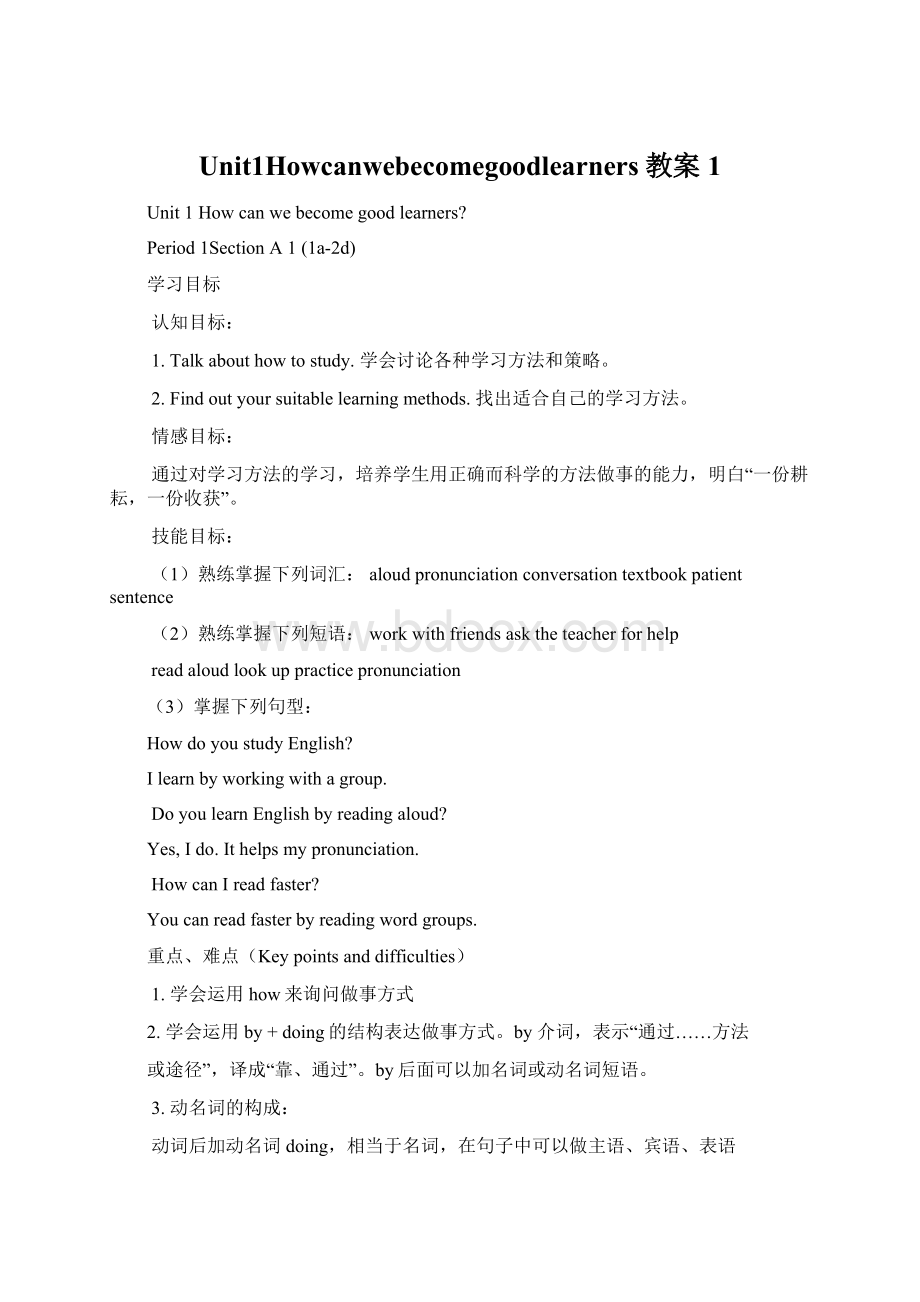Unit1Howcanwebecomegoodlearners教案1Word格式.docx
《Unit1Howcanwebecomegoodlearners教案1Word格式.docx》由会员分享,可在线阅读,更多相关《Unit1Howcanwebecomegoodlearners教案1Word格式.docx(18页珍藏版)》请在冰豆网上搜索。

by后面可以加名词或动名词短语。
3.动名词的构成:
动词后加动名词doing,相当于名词,在句子中可以做主语、宾语、表语
定语等。
Step1Warmingup
T:
HowdoyoustudyEnglish?
DoyoustudyEnglishbythefollowingways?
(Showsomepicturesandpresenttheimportantphrases.)
S:
IstudyEnglishby______.
byworkingwithfriends.
bymakingwordcards.
Step21aCheckthewaysyoustudyEnglish.Thenaddotherwaysyousometimesstudy.
___a.byworkingwithfriends.
___b.bymakingwordcard.
___c.byreadingthetextbook.
___d.bylisteningtotapes
___e.byaskingtheteacherforhelp.
…
Step3Listening
1)Listen.Howdothesestudentsstudyforatest?
Writelettersfrom1aabove.
2)Checktheanswers:
b(Meiping);
e(Peter);
d(Tony)
Step4Guess
Showsomepictures.
Guess:
Howdoeshe/shestudyEnglish?
He/ShestudiesEnglishby…
HowdotheystudyEnglish?
TheystudyEnglishby…
Step5Pairwork
1cMakeconversationsabouthowyoustudyforatest.
A:
Howdoyoustudyforatest?
B:
Istudybyworkingwithagroup.
Istudyby…
Step6Listening
2aListenandcheckthequestionsyouhear.
2bListenagain.Matcheachanswerbelowwithaquestionabove.
Step7Pairwork
1.2cMakeconversationsusingtheinformationin2aand2b
Haveyoueverstudiedwithagroup?
Yes,Ihave.I’velearnedalotthatway.
Showsomepictures.
1)A:
DoyoulearnEnglishbywatchingmovies?
Yes,it’saveryinterestingway.
C:
No,it’stoohardtounderstandspokenEnglish.
2)A:
WhataboutwritingletterstoapenpalinAmerica?
Yes,ithelpstoimprovemywritingskillsandknowalotabout
America.
3)A:
DoyouhaveconversationswithfriendsinEnglish?
Ofcourse,wecantalkaboutplentyofthingslikeschool,pets,
movies,andourparents.
2.2cRole-playtheconversation.
Step8Summary
1.byworkingwithfriends
2.bywatchingEnglishmovies.
3.bymakingwordcards.
4.byreadingthetextbook.
5.bylisteningtotapes.
6.byaskingtheteacherforhelp.
7.byreadingaloud.
…
Step9Languagepoints
1.Istudybyworkingwithagroup.
我通过小组活动来学习。
by作为介词,用法很多。
请仔细观察下面的例句,分析by的用法,然后补全结论部分所缺的内容。
【例句】
1)Comeandsitbyus.
2)Petergoestoworkbybuseveryday.
3)Tonywillcomebackby10:
00pm.
4)Englishisspokenbylotsofpeople.
5)Mybrotherstudieshistorybyworkingwithagroup.
【结论】
1)by可表示位置,
(1)“__________”,如句1。
也有“从……旁边(经过)”之意。
2)by可表示交通、传递等的方式,如句2。
3)by可表示时间,“到(某时)之前;
不迟于”,如句3。
4)by可用于构成
(2)________,“被,由”,如句4。
5)by可表示方式或手段,(3)“____________”结构在句中作方式状语,“通过……方式(方法)”或“借助……手段”,如句5。
Answers:
(1)在……旁边
(2)被动语态(3)by+V-ing形式
2.Whataboutreadingaloudtopracticepronunciation?
大声朗读来练习发音怎么样?
辨析aloud,loud和loudly
aloud出声地;
大声地。
常与read/call等词连用,不用于比较级。
e.g.Don’treadaloudinthelibrary.不要在图书馆大声朗读。
loud大声地;
喧闹地。
指说话声和笑声,常与talk/speak/laugh/sing等词连用,常用比较级。
e.g.Wecan’thearyou.Pleasespeaklouder.
我们听不到你的声音。
请再大声点。
loudly高声地;
可以和loud互换,含有“吵闹”的意思,不悦耳。
Whatabout/Howabout…?
后跟名词,代词或v.-ing。
用于征求意见。
e.g.Whataboutacupoftea?
喝杯茶怎么样?
Howaboutyou?
你呢?
What/Howaboutgoingtothezoothisafternoon?
今天下午去动物园怎么样?
3.It’stoohardtounderstandspokenEnglish.
句中的it是形式主语,不定式短语tounderstandspokenEnglish是真正的
主语,too修饰形容词hard。
该句句型为:
It’s+too+adj.+(forsb.)+todosth.
意思是“(对某人来说)做某事是……的”。
如:
It’stooeasyforhertoanswerthequestion.
It’snecessarytoeathealthyfood.
4.Don’treadwordbyword,readwordgroups.
句中的wordbyword意思是“逐字地”,by表示速率。
daybyday意为“一天天地”,stepbystep意为“逐步地”。
5.patient
★patient可作形容词,意为“有耐心的”,在句中可作定语或表语。
Daveisapatientperson.
You’lljusthavetobepatient.
短语bepatientwithsb.意为“对某人有耐心”。
She’sverypatientwithyoungchildren.
★patient还可作名词,意为“病人”。
Severalpatientsarewaitingtoseethedoctor.
6.Themoreyouread,thefasteryou’llbe.
“the+比较级+...,the+比较级+...”表示“越……,就越……”。
Thewarmertheweatheris,thebetterIwillfeel.
Step10Homework
WhataboutphysicsandChinese?
Makealist.
Period2SectionA2(3a-3b)
expressionsdiscoversecretgrammar
connect…with…payattentionto
Onewayisbylisteningtotapes.
Butwhetherornotyoucandothiswelldependsonyourlearninghabits.
Step1Revision
Givethestudentssomepictures,thenletthemtalkabout:
Istudyby______________.
Step2Reading
1.Warmingup
Lookatthepictureonpage3,thenletthestudentstalkabout:
ThegirlisWeiFen.Whatisshedoing?
Canyouguesshowshestudies
English?
2.Reading
Finish3a:
ReadthepassageaboutWeiFenandanswerthequestions.
1)WhydidWeiFenfinditdifficulttolearnEnglish?
2)WhatdidshedoinEnglishclass?
3)Whatisthesecrettolanguagelearning?
secretn.秘密;
秘诀adj.秘密的;
保密的
Finish3b:
CompletethesentenceswithwhatWeiFenlearnedfromwatchingmovies.Usewordsandphrasesfromthepassage.
expressionn.表情;
表示;
表达方式
Step3Languagepoints
1.WhydidWeiFenfinditdifficulttolearnEnglish?
finditdifficult/hardtodosth.发现做某事很困难
【find用法归纳】
findsb.doingsth.发现某人做某事
findit+adj.+todosth.发现做某事很……
findit+adj.todosth.中的it是形式宾语,adj.做宾补,todosth.是真正的宾语。
同类的动词还有think,feel,consider等。
2.ButIwasafraidtoaskquestionsbecauseofmypoorpronunciation.
afraid用法归纳
afraid用作形容词,意思是“害怕的;
畏惧的”,在句中只能作表语。
含有afraid的常用结构有:
★beafraidofsb./sth.意为“害怕某人/物”。
如:
I’mafraidofmymother.
Janeisafraidofdogs.
★beafraidofdoing/todosth.意为“害怕做某事”。
Monaaloneatisafraidofwalking/towalknight.
3.Idiscoveredthatlisteningtosomethinginterestingisthesecrettolanguagelearning.
discoverv.发现;
发觉
指偶然或经过努力发现原来客观存在但不为人所知的事物。
e.g.ColumbusdiscoveredAmericain1492.哥伦布于1492年发现了美洲。
4.Ialsolearnedusefulsentenceslike“It’s
apieceofcake”or“Itservesyouright.”
apieceofcake和servessb.right是英语中的两个习惯用语,也可称作习语idiom(s)。
同汉语中的成语类似,习语是人们在长期的语言运用中约定俗成的一种固定表达方式,其意思往往不是字面所表达的含义。
如:
apieceofcake表示事情非常简单、易于解决,相当于汉语的“小菜一碟;
小事一桩”;
servessb.right则相当于汉语说某人“活该”。
5.ButbecauseIwantedtounderstandthestory,Ilookedthemupinadictionary.
lookup(在词典、参考书中或通过电脑)查阅时,其宾语可为名词(短语)或代词。
当其宾语为名词(短语)时,该名词(短语)可位于up之后,也可位于look和up之间;
当其宾语为代词时,该代词位于look和up之间。
Youcanlookupanewword/lookanewwordupinthedictionary.
Ifyoudon’tknowtheword,youcanlookitupinthedictionary.
【look用法归纳】
lookafter照顾
looklike看起来像
lookout当心,小心
lookthrough浏览
lookfor寻找
lookforwardto期待
lookaround向四周看
have/takealook看一看
lookover检查
Step4Summary
发现做某事很难finditdifficulttodosth.
语言学习的秘密thesecrettolanguagelearning
害怕做某事beafraidtodosth.
爱上fallinlovewith
肢体语言bodylanguage
脸上的表情theexpressionsonthefaces
关健词keywords
对……感兴趣beinterestedin
查字典lookupthewordinthedictionary
Step5Homework
1.Recitetheimportantsentencesinthepassageonpage3.
2.Rememberthewordsandphrasesinthislesson.
Period3SectionA3(GrammarFocus—4c)
repeatnotepronounceincreasespeedpartnercreateactive
Step1Freetalk
Talkaboutthewaysyoulearnothersubjects.Youcanusethefollowingphrasesandsentences.
HowdoyoulearnChinese/math/physics/chemistry?
Doyoulearnhistoryandgeographyby___________?
Step24a
Answerthequestions.Thenmatchthequestionsandanswers.
1.Howdoyoupracticespeaking?
2.Howdoyoulearnnewwords?
3.Howdoyouimproveyourwriting?
4.Howdoyoupracticelistening?
5.Howdoyouimproveyourpronunciation?
6.Howdoyoulearngrammar?
a.BywatchingEnglishprograms.
b.Bylisteningtoatapeandrepeatingoutloud.
c.Byhavingconversationswithfriends.
d.Bytakingnotes,doingexercisesandreadingalot.
e.Bymakingwordcards.
f.Bywritinge-mailstomypenpals.
Step34b
makesentencesusingthestructure“dosth.bydoing”withthesubjectsintheboxandinformationthatistrueforyou.
e.g.IusuallypracticemyEnglishbytakingnotes/readingbooksandnewspapers/speakingEngli